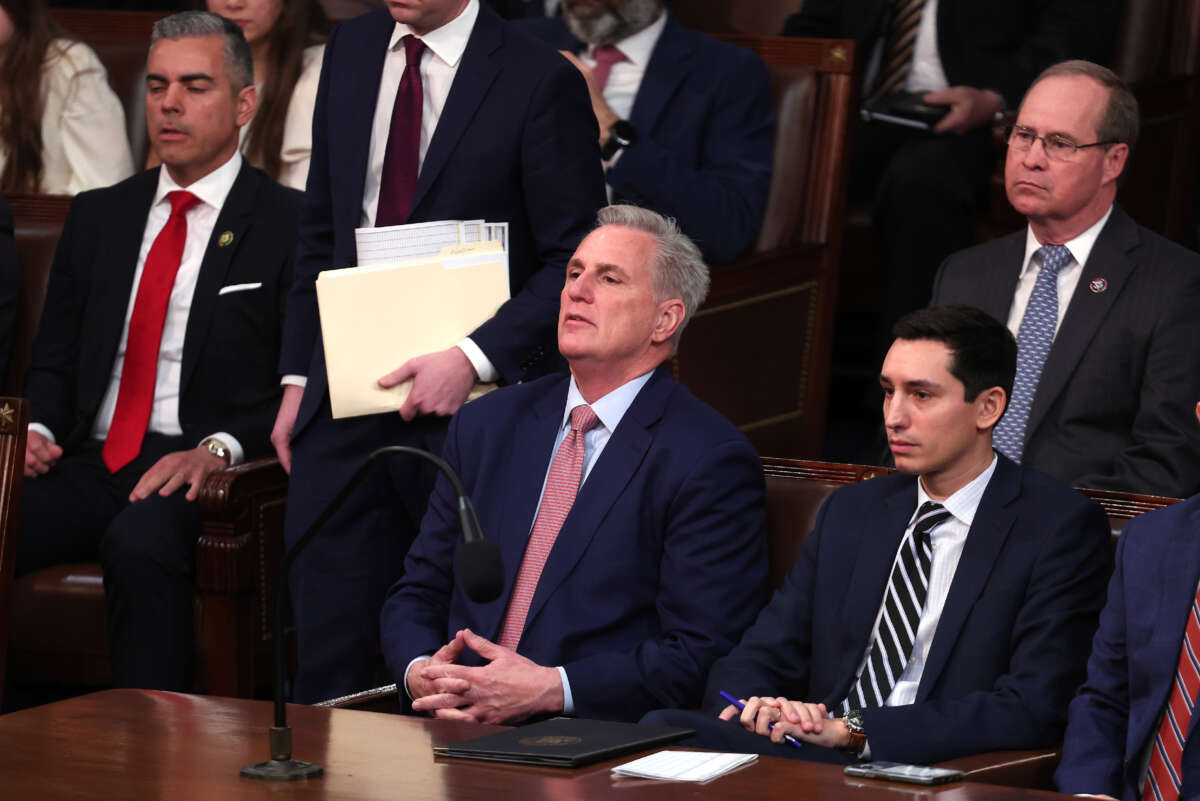Support justice-driven, accurate and transparent news — make a quick donation to Truthout today!
Republicans have officially taken control of the U.S. House of Representatives following their narrow victory in the 2022 midterm elections — but who will lead the party is still in question, as GOP leader Rep. Kevin McCarthy (R-California) failed to garner the votes necessary to become Speaker of the House on Tuesday.
Instead, in the first round of voting, Rep. Hakeem Jeffries (D-New York), the Democratic leader of the House, won a plurality of votes. That result won’t have any bearing on who becomes the eventual speaker, but it is an embarrassing outcome for McCarthy, who was presumed to win the speakership prior to the midterms.
Jeffries will “not be named Speaker, of course,” political commentator Brian Normoyle wrote on Twitter, “but the optics of that will forever be imprinted on the tenure of whichever Republican ultimately prevails.”
In order to secure the position, McCarthy needed at least 218 members of the House to vote in favor of his speakership. With every Democratic member of the House opposing him, he could only afford to lose four votes from within his own caucus, as Republicans compose 222 out of the 435 seats in the chamber.
At the end of the roll call vote, McCarthy had received 203 votes, while Rep. Hakeem Jeffries (D-New York) had received 212 votes as the main opposition leader. Ten votes went to Rep. Andy Biggs (R-Arizona) and nine votes went to other candidates.
A second vote was held immediately after the first. On that ballot, McCarthy also failed to attain a majority, securing 203 votes while Jeffries got 213 votes, once again securing a plurality. Jim Jordan, who encouraged his supporters to back McCarthy, nonetheless was nominated by Rep. Matt Gaetz (R-Florida) to be Speaker, and received 19 votes, while zero lawmakers voted for someone else this time around.
More votes will be needed in order for someone to attain a majority and become speaker of the House. McCarthy has reportedly said it could take days before a candidate receives a majority.
Prior to the vote, at least five far right Republicans had vowed to vote against McCarthy, with more GOP lawmakers indicating they were quietly opposed to McCarthy or on the fence about his speakership. McCarthy attempted to whip up more support on Tuesday morning, but according to reporting from The New York Times, momentum appears to be swinging in the opposite direction.
Those opposed to McCarthy cite his unwillingness to capitulate to their demands.
“At nearly every turn [during negotiations], we’ve been sidelined or resisted by McCarthy, and any perceived progress has often been vague or contained loopholes that further amplified concerns as to the sincerity of the promises being made,” Rep. Scott Perry (R-Pennsylvania) said.
McCarthy has offered some concessions to those who oppose him, including allowing just five Republicans to put forward a no-confidence vote against him, if they decide to do so in the future. But the GOP leader says other requests — including the far right coalition’s demands that specific members from within their ranks be placed in charge of certain committees — were going too far.
“Last night I was presented [with the idea that] the only way to have 218 votes [was] if I provided certain members with certain positions,” McCarthy told reporters on Tuesday, adding that one of the far right Republican lawmakers making such demands, Florida Rep. Matt Gaetz, said to McCarthy, “I don’t care if we go to plurality and we elect [Democratic House Leader] Hakeem Jeffries.”
The situation remained heated just ahead of the swearing-in ceremony of the 118th session of Congress, when McCarthy met with Republicans behind closed doors and insisted in a “fiery” speech to his colleagues that he had “earned this job,” according to sources who spoke to CNN.
McCarthy told his fellow Republicans that he wouldn’t make any more concessions to secure the speakership. Perhaps showcasing how difficult his chances remain, Rep. Lauren Boebert (R-Colorado), one of the far right holdouts vowing to vote against him, reportedly yelled “bullshit” at one point during the speech.
McCarthy’s inability to win the speakership on the first vote is historic; multiple ballots to decide on the position have been needed only 14 times in the 127 votes for Speaker of the House in U.S. history. The last time multiple votes were needed was 100 years ago, in 1923.
It’s possible the situation will take several days — perhaps even weeks — to resolve, especially if the far right coalition of Republicans maintain their steadfast opposition to McCarthy, as they’ve indicated they will.
Holding Trump accountable for his illegal war on Iran
The devastating American and Israeli attacks have killed hundreds of Iranians, and the death toll continues to rise.
As independent media, what we do next matters a lot. It’s up to us to report the truth, demand accountability, and reckon with the consequences of U.S. militarism at this cataclysmic historical moment.
Trump may be an authoritarian, but he is not entirely invulnerable, nor are the elected officials who have given him pass after pass. We cannot let him believe for a second longer that he can get away with something this wildly illegal or recklessly dangerous without accountability.
We ask for your support as we carry out our media resistance to unchecked militarism. Please make a tax-deductible one-time or monthly donation to Truthout.
